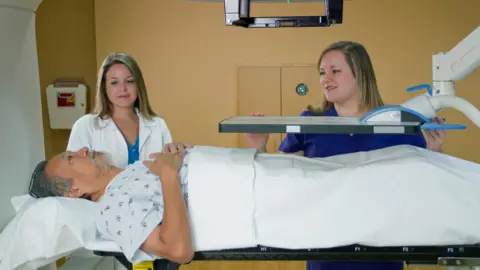Prostate cancer MRI scans to be introduced after pilot
 Mark Kostich/Getty Images
Mark Kostich/Getty ImagesNon-invasive MRI scans for detecting prostate cancer on the NHS have been given approval by a health body.
The scans have been piloted in three areas, but campaigners urged for them to be made available all over Wales.
Now, the National Institute for Health and Care Excellence (NICE) has backed MRIs as cost-effective and able to detect more cancers.
The Welsh Government said health boards were preparing for changes ahead of NICE finalising guidelines next year.
Prostate cancer - which can affect one in nine men in Wales - can be difficult to diagnose and biopsies can be both invasive and painful.
Multi-parametric MRIs (mpMRIs) combine up to three different types of scan for a clearer picture of the prostate. Images are also enhanced by the injection of a dye.
It gives specialists a better sight of the prostate to decide whether a biopsy is needed.

Stuart Davies, 71, from Llangollen, Denbighshire, had to pay £900 for a private mpMRI scan in September 2017 after his cancer returned.
He campaigned for the scan to be available Wales-wide and a 6,000-signature petition was submitted to the assembly petitions committee, who discussed it on Tuesday.
Mr Davies has just managed to secure a rebate from Betsi Cadwaladr University Health Board, but said with NHS buying power, the scans could cost £300.
He now wants NHS-funded scans from private mobile units until new scanners are delivered to Bronglais and Glan Clwyd hospitals.
"This is a game-changer," said Mr Davies. "I'm more than happy but the next stage has to be for the Welsh Government to provide the funds in the interim."
The scans were available in Cardiff and Vale, Aneurin Bevan and Cwm Taf health boards as part of the pilot.
NICE's draft guidance is likely to result in a formal recommendation in the new year.
Paul Chrisp, NICE's centre for guidelines director, said: "This diagnostic pathway will hopefully improve survival, reduce unnecessary surgery and benefit both patients and the NHS in the long term."

Analysis by Owain Clarke, BBC Wales health correspondent
Not every decision by NICE gets much attention, but the body serves an important purpose - it weighs how best to spend scarce NHS resources.
It has been looking at this form of diagnosis and found it should be available on the NHS across England and Wales in future.
Some patients and campaigners who felt they were missing out had been pushing for a level playing field.
They argued some patients in parts of south Wales had been able to access these pre-biopsy MRIs as part of pilot schemes, but the Welsh Government said it was waiting for NICE approval.
Today's decision paves the way for a final green light to be given early next year.

Claudia McVie, Tenovus Cancer Care chief executive, welcomed the new draft guidelines but said significant capacity issues were facing diagnostic services in Wales and the rest of the UK.
"It is imperative Welsh Government invests in improving diagnostic capacity across Wales and developing their diagnostic workforce," she said.
This was echoed by Andy Thomas, a surgeon and chairman of Prostate Cymru. He said it was an important development in the detection and treatment of prostate cancer but there needed to be more MRI scanners and radiologists also needed to be trained up.
